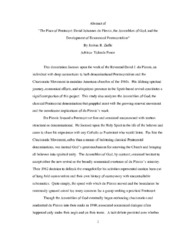| dc.contributor.author | Ziefle, Joshua | en |
| dc.date.accessioned | 2021-01-14T19:55:28Z | |
| dc.date.available | 2021-01-14T19:55:28Z | |
| dc.date.issued | 2010-11 | en |
| dc.identifier.uri | archives.northwestu.edu/handle/nu/55303 | |
| dc.description | A dissertation submitted to the faculty of Princeton Theological Seminary in partial fulfillment of the requirements for the degree of Doctor of Philosophy. | en |
| dc.description.abstract | This dissertation focuses upon the work of the Reverend David J. du Plessis, an individual with deep connections to both denominational Pentecostalism and the Charismatic Movement in mainline American churches of the 1960s. His lifelong spiritual journey, ecumenical efforts, and ubiquitous presence in the Spirit-based revival constitutes a significant portion of this project. This study also analyzes the Assemblies of God, the classical Pentecostal denomination that grappled most with the growing renewal movement and the unwelcome implications of du Plessis’s work. | en |
| dc.description.abstract | Du Plessis favored a Pentecost set free and remained unconcerned with matters structural or denominational. He focused upon the Holy Spirit in the life of the believer and came to share his experience with any Catholic or Protestant who would listen. For him the Charismatic Movement, rather than a means of bolstering classical Pentecostal denominations, was instead God’s great mechanism for renewing the Church and bringing all believers into spiritual unity. The Assemblies of God, by contrast, remained hesitant to accept either the new revival or the broadly ecumenical overtones of du Plessis’s ministry. Their 1962 decision to defrock the evangelist for his activities represented caution born out of long-held conservatism and their own history of controversy with uncontrollable schismatics. Quite simply, the speed with which du Plessis moved and the boundaries he summarily ignored raised too many concerns for a group seeking a practical Pentecost. | en |
| dc.description.abstract | Though the Assemblies of God eventually began embracing charismatics and readmitted du Plessis into their ranks in 1980, associated ecumenical dialogue often happened only under their aegis and on their terms. A tacit debate persisted over whether classical Pentecostalism should shepherd such revivals or if the Charismatic Movement must continue as a separate renewal in places ecclesiastically and theologically diverse. Even so, that du Plessis and the Assemblies of God could come together to accept charismatics with a common Pentecostal encounter suggests great potential for unity within such shared spiritual experience. This project thus highlights the debate over the “place of Pentecost” and recalls the contributions of an often forgotten Pentecostal ecumenist. | en |
| dc.description.tableofcontents | Introduction: Uncovering Pentecost -- Chapter one: A practical Pentecost -- Chapter two: The path of Pentecost -- Chapter three: Irreconcilable Pentecosts -- Chapter four: Not Babel, but Pentecost -- Chapter five: Pentecost set free? -- Conclusion: The lessons of Pentecost | en |
| dc.format.extent | viii, 289 pages | en |
| dc.format.medium | PDF | en |
| dc.language.iso | en | en |
| dc.publisher | Princeton Theological Seminary | en |
| dc.rights | This original work is protected by copyright. Copyright is retained by the author(s). Works may be viewed, downloaded, or printed, but not reproduced or distributed without author(s) permission. | en |
| dc.rights.uri | http://archives.northwestu.edu/page/copyright | en |
| dc.title | The Place of Pentecost: David Johannes du Plessis, the Assemblies of God, and the Development of Ecumenical Pentecostalism | en |
| thesis.degree.name | Doctor of Philosophy | en |
| thesis.degree.level | Doctoral | en |
| thesis.degree.grantor | Princeton Theological Seminary | en |
| thesis.degree.discipline | Theology | en |


 Maintained by the Northwest University Library
Maintained by the Northwest University Library